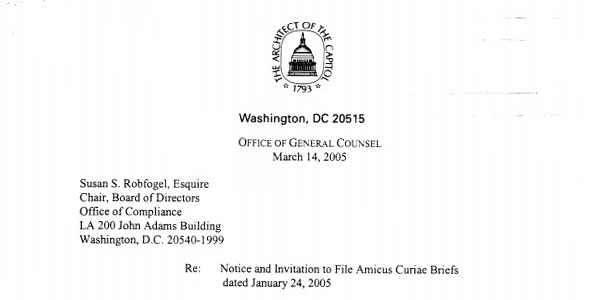The Office of the Architect of the Capitol(hereinafter AOC) and others who are interested have been invited by the Board of Directors of the Office of Compliance (hereinafter the Board) to provide an amicus brief concerning Section 207(a), 2 U.S.C. 1317(a), of the Congressional Accountability Act (hereinafter CAA). The Board invites answers to five specific questions, all of which involve the legal standards that should apply to claims brought under Section 207. AOC respectfully submits this brief in response to this invitation.
INTRODUCTION AND GENERAL COMMENTS
Test Section 207 prohibits discrimination or reprisal against legislative employees who have exercised rights protected by the CAA or opposed any practices made unlawful under the CAA, The statute reads in relevant part:
SEC. 207. PROHIBITION OF INTIMIDATION OR REPRISAL
Test Sec. 207(a)
(a) IN GENERAL.—It shall be unlawful for an employing office to intimidate, take reprisal against, or otherwise discriminate against, any covered employee because the covered employee has opposed any practice made unlawful by this Act, or because the covered employee has initiated proceedings, made a charge, or testified, assisted, or participated in any manner in a hearing or other proceeding under this Act.
The starting point for construing the statute must be its language. To establish a reprisal claim, Section 207 requires, that the employee demonstrate, first, that he or she (a) opposed an unlawful practice, or (b) made a charge or participated in some capacity in a hearing or other proceeding under the CAA. Second, the employee must show that the employing office “ intimidate[d], [took] reprisal” or “otherwise discriminate[d] ” “against” the employee. Third, the employee must demonstrate that the employing office took this action “because” the employee opposed an unlawful practice or participated in a CAA proceeding. Unless all of these requirements are met, an employee does not have an actionable reprisal claim under the CAA.

